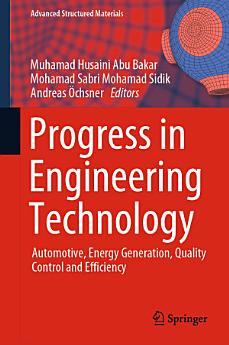Progress in Engineering Technology: Automotive, Energy Generation, Quality Control and Efficiency
Mayelana nale ebook
Mayelana nomlobi
Andreas Öchsner is a Full Professor of Lightweight Design and Structural Simulation at Esslingen University of Applied Sciences, Germany. After receiving his Dipl.-Ing. degree in Aeronautical Engineering from the University of Stuttgart (1997), Germany, he served as a research and teaching assistant at the University of Erlangen-Nuremberg from 1997 to 2003 while working to complete his Doctor of Engineering Sciences degree. From 2003 to 2006, he was an Assistant Professor at the Department of Mechanical Engineering and Head of the Cellular Metals Group affiliated with the University of Aveiro, Portugal. He spent seven years (2007–2013) as a Full Professor at the Department of Applied Mechanics, Technical University of Malaysia, where he was also Head of the Advanced Materials and Structure Lab. From 2014 to 2017, he was a Full Professor at the School of Engineering, Griffith University, Australia, and Leader of the Mechanical Engineering Program (Head of Discipline and Program Director).
Muhamad Husaini Abu Bakar is Director of System Engineering and the Energy Laboratory and Head of the Research and Innovation Section at the Universiti Kuala Lumpur – Malaysian Spanish Institute, Malaysia. After receiving his Bachelor’s degree in Manufacturing Engineering with Management from the Universiti Sains Malaysia (2007), Malaysia, he worked with the university’s Underwater Robotic Research from 2007 to 2012, and was awarded a Master of Science in Advanced Manufacturing in 2011. Since 2012 he has been a lecturer at the Universiti Kuala Lumpur – Malaysian Spanish Institute, and completed his Doctor of Philosophy in Advanced Manufacturing from Universiti Sains Malaysia in 2017. His research interests are related to smart manufacturing, energy, and atomistic modeling. He has published over 50 scientific publications on Deep Learning, computational atomistic and metal-air batteries. His inventions and contributions to smart materials and smart monitoring systems have been recognized with innovation awards from PECIPTA, IIDEX, ICOMPEX, I-ENVEX and MARA.
Mohamad Sabri Mohamad Sidik completed his Bachelor’s degree in Mechanical Engineering at Universiti Sains Malaysia, Pulau Pinang, in 2005. In the same year, he began working as a mechanical design engineer and handled several projects at a local company until 2009. He subsequently worked as an assistant lecturer at the Universiti Kuala Lumpur Malaysian Spanish Institute, Kedah, Malaysia and was appointed as a Program Coordinator of Diploma of Engineering Technology in Mechanical Design and Development. He received his Master’s degree in Manufacturing System Engineering from the Universiti Putra Malaysia, Selangor, Malaysia in 2012. His research interests in mechanical engineering are in the areas of natural fiber composites, finite element methods for mechanical structures, electric and underwater vehicle design, and metal-air batteries. Currently, he is a doctoral student at the Universiti Kuala Lumpur and is exploring the capabilities of metal clusters, especially in the context of alternative energies.










